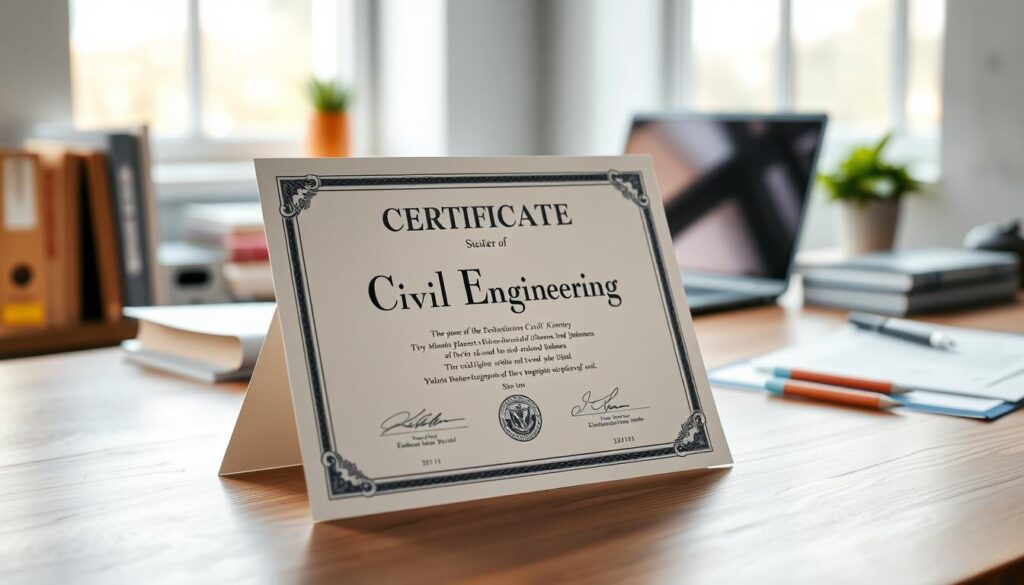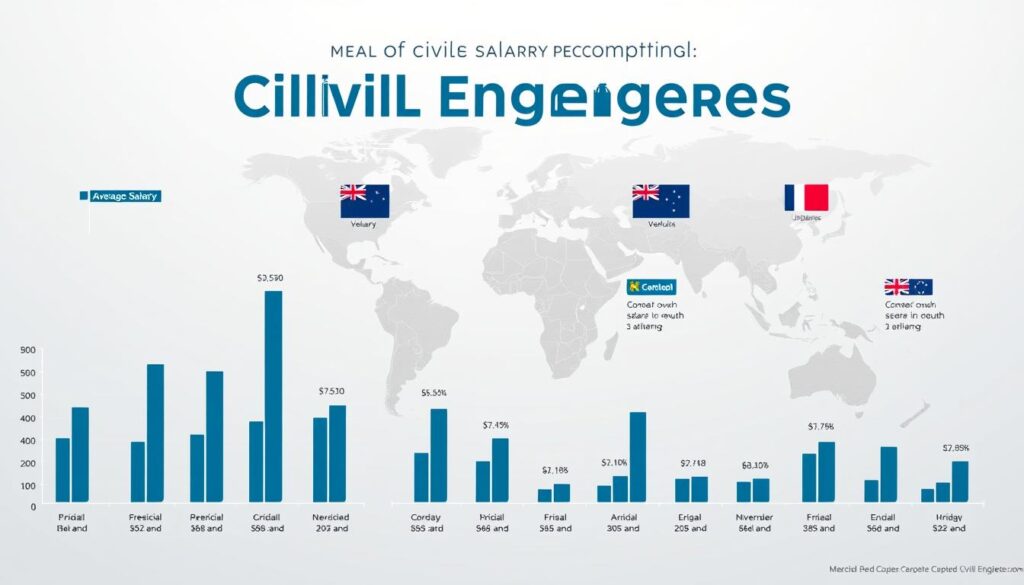New Zealand’s infrastructure is rapidly evolving, creating a high demand for skilled professionals in the field. If you’re considering a career in this domain, you’re on the right track. The country’s strong economy and growing population are driving the need for innovative solutions in construction and development.
Career opportunities abound in New Zealand, with various roles available in project management, design, and construction. The job market is competitive, but the rewards are worth it, with attractive salary ranges for qualified professionals.
Key Takeaways
- New Zealand’s infrastructure growth drives demand for civil engineers.
- Career opportunities are available in project management, design, and construction.
- The job market is competitive, with attractive salary ranges.
- Educational requirements include a degree from a reputable institution.
- Skills in innovation and problem-solving are highly valued.
The Civil Engineering Landscape in New Zealand
Civil engineering in New Zealand is a thriving industry, driven by government investments in infrastructure and a growing demand for skilled professionals. The country’s infrastructure needs are diverse, ranging from transportation systems to water management and energy projects.
Current State of the Industry
The civil engineering industry in New Zealand is currently in a state of robust growth. This is largely due to significant investments in infrastructure projects, which are essential for the country’s economic development. The industry is characterized by a mix of large-scale projects and smaller, localized initiatives.
Key Infrastructure Projects
Several major infrastructure projects are underway in New Zealand, including transportation upgrades, new energy facilities, and water management systems. These projects not only drive economic growth but also create a demand for skilled civil engineers.
Economic Impact and Importance
The economic impact of the civil engineering industry in New Zealand is substantial. Infrastructure projects contribute to the country’s GDP and create employment opportunities. The industry’s importance extends beyond economic benefits, as it also plays a critical role in developing the country’s infrastructure, enhancing public safety, and supporting environmental sustainability.
| Infrastructure Project | Location | Economic Impact |
|---|---|---|
| Transportation Upgrade | Auckland | Significant job creation and GDP growth |
| New Energy Facility | Wellington | Enhanced energy security and reduced costs |
| Water Management System | Christchurch | Improved public health and environmental sustainability |
Civil Engineering Salary in New Zealand: A Comprehensive Guide
Understanding the financial aspects of a career in civil engineering is crucial for both aspiring and current professionals in New Zealand. The salary for civil engineers can vary significantly based on factors such as experience, location, and specific industry sector.
Average Salary Ranges by Experience Level
Civil engineering salaries in New Zealand are competitive, with variations based on experience. Here’s an overview of average salary ranges:
| Experience Level | Average Salary (NZD) |
|---|---|
| Entry-Level (0-3 years) | $60,000 – $80,000 |
| Mid-Level (4-7 years) | $90,000 – $120,000 |
| Senior (8+ years) | $130,000 – $160,000+ |
Factors Affecting Compensation
Several factors influence civil engineering salaries in New Zealand, including experience, qualifications, location, and industry sector. Professionals with specialized skills or those working in high-demand areas tend to earn higher salaries.
“The demand for skilled civil engineers in New Zealand is high, driven by infrastructure projects and urban development. This demand is reflected in competitive salaries for professionals with the right skills and experience.”
Recent Salary Trends and Forecasts
Recent trends indicate a steady increase in civil engineering salaries in New Zealand, driven by government infrastructure investments and a shortage of skilled professionals. Forecasts suggest continued growth in salaries as the demand for civil engineers remains strong.

The civil engineering sector in New Zealand offers a promising career path with competitive salaries. Understanding the factors that influence salary can help professionals make informed decisions about their careers.
Career Paths in Civil Engineering
Civil engineering is a dynamic field that offers a broad spectrum of career opportunities, including various specializations and leadership roles. Civil engineers play a crucial role in shaping the built environment, from designing and constructing infrastructure to managing complex projects.
Specializations and Focus Areas
Civil engineers can specialize in various areas, including:
- Structural engineering, focusing on the design and analysis of buildings and bridges
- Transportation engineering, dealing with the planning and development of transportation systems
- Water resources engineering, concerned with the management of water supply and flood control systems
- Geotechnical engineering, involving the study of the behavior of earth materials
These specializations allow civil engineers to develop deep expertise and contribute to specific areas of infrastructure development.
Career Progression Opportunities
As civil engineers gain experience, they can progress to more senior roles, such as project managers or department heads. Career advancement opportunities include:
- Taking on more complex projects and responsibilities
- Moving into leadership positions, overseeing teams and projects
- Pursuing specialized certifications or further education to enhance career prospects
Typical Career Trajectory
A typical career trajectory for a civil engineer might begin with entry-level positions, such as design or site engineering roles. As they gain experience, they can move into senior engineering positions, followed by project management or leadership roles. The career path may involve transitioning between different sectors, such as from consulting to government or from construction to academia.
Educational Requirements for Civil Engineers
The path to a successful civil engineering career in New Zealand begins with the right education. Aspiring civil engineers must navigate through a structured educational pathway to acquire the necessary skills and knowledge.

Degree Programs and Certifications
Civil engineers typically require a bachelor’s degree in civil engineering or a related field from a recognized institution. The degree program should be accredited by Engineering New Zealand, the professional body that oversees the engineering profession in New Zealand. Some civil engineers also choose to pursue postgraduate degrees for advanced knowledge and specialization.
Professional Registration Process
After completing their degree, aspiring civil engineers must undergo a professional registration process. This involves demonstrating their competence through work experience and passing a registration exam. Registration with Engineering New Zealand is essential for practicing as a professional engineer in New Zealand.
Continuing Education Requirements
Civil engineers must commit to continuing education to stay updated with the latest technologies, practices, and regulations. This ongoing professional development is crucial for career advancement and maintaining registration. It involves participating in workshops, seminars, and courses that enhance their skills and knowledge.
By fulfilling these educational requirements, civil engineers in New Zealand can ensure they are well-equipped to handle the challenges of their profession and contribute to the country’s infrastructure development.
Engineering Auckland University: Undergraduate Programs
With a strong reputation for academic excellence, the University of Auckland’s Faculty of Engineering is a top choice for aspiring engineers. The faculty offers a range of undergraduate programs designed to provide students with a comprehensive education in various engineering disciplines.
Bachelor of Engineering Degrees
The University of Auckland offers several Bachelor of Engineering degrees, catering to different interests and career aspirations. These programs are designed to equip students with the theoretical knowledge and practical skills necessary to excel in their chosen field. Some of the key areas of study include civil engineering, mechanical engineering, and electrical and electronic engineering.
Admission Requirements and Process
To be eligible for the Bachelor of Engineering programs, students must meet specific admission requirements. These typically include achieving certain grades in relevant subjects during high school, such as mathematics and physics. The application process involves submitting an online application through the University of Auckland’s website, along with required documents like academic transcripts and proof of identity.
Student Resources and Support
The University of Auckland is committed to providing its engineering students with the resources and support they need to succeed. This includes access to state-of-the-art facilities, academic advising, and various student organizations. These resources help students navigate their academic journey and prepare for their future careers in engineering.
By choosing the University of Auckland’s Faculty of Engineering for their undergraduate studies, students can be confident in receiving a high-quality education that prepares them for a successful career in their chosen engineering discipline.
Engineering Auckland University: Graduate and Research Opportunities
For those looking to advance their engineering careers, the University of Auckland offers exceptional graduate opportunities. The faculty is committed to providing a stimulating academic environment that fosters innovation and research excellence.

Master’s and PhD Programs
The University of Auckland’s engineering faculty offers a range of graduate programs, including Master’s and PhD degrees. These programs are designed to equip students with advanced technical knowledge and research skills, preparing them for leadership roles in their chosen fields.
Master’s Programs typically involve a combination of coursework and research, allowing students to specialize in areas such as structural engineering, environmental engineering, or mechatronics.
PhD Programs, on the other hand, are research-intensive and enable candidates to contribute original knowledge to their field, under the guidance of experienced faculty members.
Research Centers and Facilities
The University of Auckland is home to several world-class research centers and facilities that provide graduate students with hands-on experience and access to cutting-edge technology. For instance, the Faculty of Engineering’s research centers focus on areas like sustainable energy, advanced materials, and infrastructure resilience.
“The University of Auckland’s research environment is truly collaborative, allowing students to work alongside top academics and industry partners on real-world problems.”
Industry Partnerships and Collaborations
The University of Auckland’s engineering faculty maintains strong connections with industry partners, ensuring that graduate programs remain relevant and aligned with current industry needs. These partnerships also provide opportunities for collaborative research projects, internships, and job placements.
- Research collaborations with international universities and industry leaders.
- Internship opportunities with top engineering firms in New Zealand and abroad.
- Networking events and conferences that bring together academics, industry professionals, and students.
By choosing the University of Auckland for graduate studies, students can be assured of a comprehensive education that combines academic rigor with practical experience, setting them up for success in their engineering careers.
Comparing Civil Engineering Salaries Across New Zealand Regions
Civil engineering salaries in New Zealand vary significantly from one region to another. This variation is influenced by factors such as the cost of living, demand for civil engineers, and the specific industry needs in different regions.
Auckland vs. Other Major Cities
Auckland, being the largest city in New Zealand, tends to have higher salaries for civil engineers compared to other cities. According to recent data, the average salary for a civil engineer in Auckland is around $80,000 per year, whereas in cities like Wellington and Christchurch, the average salary ranges from $70,000 to $75,000 per year.
| City | Average Salary |
|---|---|
| Auckland | $80,000 |
| Wellington | $72,000 |
| Christchurch | $70,000 |
Rural vs. Urban Compensation Differences
There’s also a notable difference in salaries between rural and urban areas. Urban areas tend to offer higher salaries due to the higher cost of living and the concentration of infrastructure projects. In contrast, rural areas often have lower salaries, but the cost of living is also generally lower.
“The disparity in salaries between urban and rural areas reflects the different economic conditions and the cost of living in these regions,” said an industry expert.
Cost of Living Considerations
The cost of living in different regions significantly affects the purchasing power of civil engineers’ salaries. For instance, while Auckland offers higher salaries, it also has a much higher cost of living compared to other cities or rural areas.
Understanding these regional differences is crucial for civil engineers when considering job opportunities and for employers looking to attract and retain talent.
Job Market Trends for Civil Engineers in New Zealand
New Zealand’s civil engineering sector is witnessing a surge in demand, driven by government initiatives and urban development. This growth is creating numerous opportunities for civil engineers across various sectors.
Growth Sectors and Emerging Fields
The civil engineering job market in New Zealand is being driven by several growth sectors, including transportation, water management, and urban planning. Emerging fields such as sustainable infrastructure and green building are also gaining traction.
Key areas of growth include:
- Transportation infrastructure projects
- Water management and conservation initiatives
- Urban planning and development projects
- Sustainable infrastructure and green building technologies
Employment Outlook and Projections
The employment outlook for civil engineers in New Zealand is positive, with a steady demand for skilled professionals. Projections indicate a continued growth in employment opportunities over the next few years.
| Year | Employment Rate | Growth Projection |
|---|---|---|
| 2023 | 85% | 5% |
| 2024 | 88% | 7% |
| 2025 | 90% | 8% |
Impact of Government Infrastructure Initiatives
Government infrastructure initiatives are playing a crucial role in driving the demand for civil engineers. Large-scale projects are being undertaken to improve transportation networks, public facilities, and other critical infrastructure.

The government’s commitment to infrastructure development is expected to continue, providing a stable source of employment for civil engineers in the coming years.
Skills in Demand for Modern Civil Engineers
Civil engineers in New Zealand must possess a blend of technical, digital, and soft skills to excel in their roles. The modern civil engineering landscape demands a diverse skill set to manage complex infrastructure projects effectively.
Technical Competencies
Technical skills remain the foundation of a civil engineer’s expertise. These include:
- Proficiency in design and analysis software
- Knowledge of geotechnical, structural, and hydraulic engineering principles
- Understanding of construction methods and materials
Engineers must stay updated with the latest technologies and methodologies to remain competitive.
Digital and Software Proficiencies
The increasing use of technology in civil engineering has made digital skills crucial. Key areas include:
- Building Information Modelling (BIM)
- Computer-Aided Design (CAD) software
- Project management tools and software
- Data analysis and interpretation
Proficiency in these digital tools enhances efficiency and collaboration on projects.
Soft Skills and Management Abilities
Beyond technical expertise, civil engineers need strong soft skills to succeed. These include:
- Effective communication and teamwork
- Problem-solving and critical thinking
- Project management and leadership
- Adaptability and time management
These skills are essential for managing projects, leading teams, and interacting with clients and stakeholders.
Civil Engineering Internships and Entry-Level Positions
For aspiring civil engineers, internships and entry-level positions are stepping stones to a successful career. These opportunities not only provide hands-on experience but also help in building a professional network that is crucial in the civil engineering field.
Finding Opportunities in New Zealand
New Zealand’s civil engineering sector is vibrant, with numerous companies offering internships to students and recent graduates. These internships are invaluable for gaining practical experience and understanding the industry’s demands.
Key sources for finding internships include:
- University career services
- Industry job boards
- Company websites
- Professional networking events
Auckland University Placement Programs
The University of Auckland offers robust placement programs for its civil engineering students. These programs connect students with potential employers and provide a platform for gaining industry experience.
| Program | Description | Duration |
|---|---|---|
| Civil Engineering Internship | Practical experience in civil engineering projects | 3-6 months |
| Co-op Program | Alternating between academic study and paid work | 1-2 years |
Building Experience and References
Internships and entry-level positions are crucial for building a resume and gaining professional references. These experiences demonstrate a candidate’s capabilities and commitment to potential employers.
“The internship experience was invaluable. It not only taught me technical skills but also gave me insight into the industry’s professional environment.” – Recent graduate, University of Auckland.
By focusing on these opportunities, aspiring civil engineers can set themselves up for success in New Zealand’s competitive job market.
Top Civil Engineering Employers in New Zealand
New Zealand’s growing infrastructure projects have attracted a mix of local and international civil engineering employers. The country’s civil engineering sector is diverse, offering a range of opportunities for professionals in the field.
Major Companies and Organizations
Some of the major companies operating in New Zealand’s civil engineering sector include:
- Downer Group
- Fulton Hogan
- Higgins Group
- McConnell Dowell
- WSP Opus
These companies are involved in various infrastructure projects, from transportation systems to building construction.
Government and Public Sector Opportunities
The New Zealand government is a significant player in the civil engineering sector, with various agencies and departments involved in infrastructure development. Some of the key government employers include:
| Government Agency | Role in Civil Engineering |
|---|---|
| Waka Kotahi NZ Transport Agency | Transport infrastructure development |
| KiwiRail | Rail network maintenance and upgrade |
| Ministry of Business, Innovation and Employment | Policy development and regulation |
International Firms with New Zealand Presence
International firms have a significant presence in New Zealand’s civil engineering market. Companies like Aurecon and Jacobs bring global expertise to local projects, contributing to the country’s infrastructure development.
“New Zealand’s infrastructure needs are driving growth in the civil engineering sector, attracting both local and international players.”
The presence of these top civil engineering employers in New Zealand creates a dynamic job market with diverse opportunities for civil engineers.

Salary Progression Throughout a Civil Engineering Career
The civil engineering field in New Zealand offers a promising career trajectory with salary progression that is both competitive and rewarding. As professionals gain experience and move into more senior roles, their compensation packages reflect their growing value to the industry.
Compensation from Entry-Level to Senior Engineer
For civil engineers in New Zealand, the journey from entry-level to senior positions is marked by significant salary increases. Entry-level engineers can expect a starting salary around $60,000 to $70,000 per annum. As they gain experience and move into senior roles, salaries can range from $100,000 to over $150,000.

Management and Executive Positions
Moving into management and executive positions can further boost earnings. These roles not only offer higher salaries but also additional benefits such as bonuses and stock options. According to industry reports, directors and senior managers in civil engineering can earn upwards of $200,000.
The Impact of Specialization on Earnings
Specializing in a particular area of civil engineering, such as structural or transportation engineering, can also impact salary. Specialists are often in high demand, and their expertise can command premium salaries. A comparison of average salaries by specialization is shown below:
| Specialization | Average Salary Range |
|---|---|
| Structural Engineering | $90,000 – $140,000 |
| Transportation Engineering | $80,000 – $130,000 |
| Water Resources Engineering | $85,000 – $135,000 |
As the data illustrates, specialization can lead to higher earning potential in the civil engineering field.
International Comparisons: How New Zealand Civil Engineering Salaries Stack Up
The global landscape of civil engineering salaries offers a fascinating comparison, with New Zealand being a key player in the Asia-Pacific region. Understanding how salaries in New Zealand compare to those in other countries can provide valuable insights for professionals considering relocation or looking to understand their earning potential on a global scale.
Comparison with Australia and Pacific Region
New Zealand’s civil engineering salaries are often compared to those in Australia due to geographical proximity and similar economic conditions. Australia tends to offer slightly higher salaries, but the difference is not significant, and New Zealand’s lower cost of living in some areas can offset the disparity. In the broader Pacific region, New Zealand’s salaries are generally more competitive compared to smaller Pacific Island nations.

Global Salary Benchmarks
On a global scale, New Zealand’s civil engineering salaries are considered moderately competitive. When compared to countries in North America and Europe, New Zealand’s salaries are lower, but they are more in line with or slightly higher than those in many developing countries. The global benchmark for civil engineering salaries varies widely based on factors like cost of living, demand for infrastructure projects, and local economic conditions.
Lifestyle and Benefits Considerations
While salary is a crucial factor, lifestyle and benefits also play a significant role in the overall compensation package. New Zealand is known for its high quality of life, work-life balance, and natural beauty, which can make it an attractive destination for civil engineers despite potentially lower salaries compared to some other countries.
Work-Life Balance in New Zealand’s Civil Engineering Sector
New Zealand’s civil engineering sector is renowned for its emphasis on achieving a harmonious work-life balance. This balance is crucial for the well-being of professionals in the field and contributes to the sector’s overall productivity and job satisfaction.
Industry Standards and Expectations
The civil engineering industry in New Zealand maintains standards that support a healthy balance between work and personal life. Typical working hours are reasonable, allowing for sufficient personal time. Moreover, many organizations prioritize flexible working arrangements, enabling employees to manage their work schedules effectively.
Benefits and Perks Beyond Salary
Beyond competitive salaries, civil engineers in New Zealand enjoy a range of benefits that enhance their work-life balance. These include:
- Generous annual leave allowances
- Comprehensive health insurance packages
- Opportunities for professional development and training
Employee Satisfaction and Retention
The emphasis on work-life balance significantly contributes to high employee satisfaction and retention rates within the sector. Civil engineers appreciate the supportive work environment, which fosters both personal and professional growth. As a result, many professionals choose to build long-term careers in New Zealand’s civil engineering sector.

By prioritizing work-life balance, New Zealand’s civil engineering sector not only enhances the well-being of its professionals but also maintains a competitive edge in the global market.
Professional Organizations and Networking Opportunities
Civil engineers in New Zealand can benefit greatly from joining professional organizations and attending industry events. These opportunities not only enhance their professional development but also provide a platform for networking and staying updated on industry trends.
Membership with Engineering New Zealand
Engineering New Zealand is the professional body that represents engineers in New Zealand. Membership with Engineering New Zealand offers numerous benefits, including access to professional development resources, networking opportunities, and advocacy on industry issues. It also provides a pathway to chartered membership, which is recognized internationally.
Auckland-Based Professional Groups
Auckland, being a major hub for civil engineering projects, hosts various professional groups that civil engineers can join. These groups often organize seminars, workshops, and social events that provide valuable opportunities for networking and learning. Some of these groups are specifically focused on areas like transportation, water resources, or structural engineering.
Conferences and Industry Events
Attending conferences and industry events is crucial for civil engineers to stay updated on the latest technologies and trends. These events offer a platform to learn from industry experts, network with peers, and showcase their work. New Zealand hosts several conferences annually, ranging from general civil engineering to specialized fields.
By engaging with professional organizations and networking opportunities, civil engineers in New Zealand can enhance their careers and contribute to the advancement of the industry.
Conclusion: Building Your Civil Engineering Career in New Zealand
New Zealand’s infrastructure development and growth create a promising landscape for civil engineering careers. With a comprehensive understanding of the industry, salary expectations, and educational requirements, individuals can make informed decisions about their career paths.
A civil engineering career in New Zealand offers diverse opportunities, from working on major infrastructure projects to specializing in various fields. By pursuing relevant education and training, such as programs offered at the University of Auckland, aspiring engineers can build a successful career.
As the demand for skilled civil engineers continues to grow, driven by government infrastructure initiatives and urban development, individuals can capitalize on these career opportunities. By staying informed about industry trends, salary expectations, and required skills, professionals can navigate their careers effectively and contribute to New Zealand’s development.
